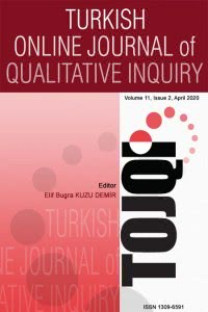Teacher Certification Policy: Evidence from Students' Perception on Certified English Teachers at One Public High School in Jambi Indonesia and Policy Implications
Öğretmen Sertifika Politikası: Endonezya Jambi'de bir devlet lisesindeki Sertifikalı İngilizce Öğretmenlerine yönelik Öğrenci algıları ile ilgili Bulgular ve Politik Çıkarımlar
___
- Aprilliyanti, E. (2013). Hubungan kompetensi kepribadian guru pkn dengan sikap demokratis peserta didik di smk negeri 1 banjarmasin. Retrieved from http://ejournal.unlam.ac.id/index.php/pkn/article/download/321/279.
- Darling-Hammond, L. (2000). Teacher quality and student achievement: A review of state policy evidence. Education Policy Analysis Archives, 8(1), 1-44.
- De Ree, J., Al-Samarrai, S., Iskandar, S., & World Bank. (2012). Teacher certification in indonesia: A doubling of pay, or a way to improve learning? Jakarta: World Bank Human Develoment Sector.
- Fetler, M. (1999). High school staff characteristics and mathematics test results. Education Policy Analysis Archive, 7(9). Retrieved January 20, 2014 from http://epaa.asu.edu/epaa/v7n9.html.
- Fuller, E.J., & Alexander, C. (2004). Does teacher certification matter? Teacher certification and middle school mathematics achievement in Texas. Paper presented at the National meeting of the American Education Research Association, San Diego.
- Hanrahan, M. (1998). The effect of learning environment factors on students' motivation and learning. International Journal of Science Education, 20(6), 737-753.
- Hanushek, E., & Rivkin, G. S. (2006). Teacher quality. Handbook of the Economics of Education, 2. Retrieved December 12, 2013 from http://edpro.stanford.edu/hanushek/content.asp?ContentId=61
- Harris, D. H., & Sass, T. R. (2009). The effects of NBPTS-certified teachers on student achievement. Journal of Policy Analysis and Management, 28(1), 55-80.
- Haryanto, E. & Mukminin, A. (2012). The Global, the national and the local goals: English Language Policy Implementation in an Indonesian International Standard School. Excellence in Higher Education Journal, 3(2), 69-78.
- Jaedun, A. (2009). Evaluasi kinerja profesional guru. Retrieved from http://staff.uny.ac.id/sites/default/files/pengabdian/drs-amat-jaedun-mpd/evaluasi- kinerja-profesional.pdf
- Jennings, P. A., & Greenberg, M. T. (2009). The prososial classroom: Teacher social and emotional competence in relation to student and classroom outcomes. Review of Educational Research, 79, 491-525.
- Kane, T. J., Rockoff, J. E., & Staiger, D.O. (2007. Photo finish: which teachers are better? Certification status isn't going to tell Us. Education Next, 7(1). Retrieved January 10, 2009 from http://www.educationnext.org.
- Lansdown, G. (2011). Every child's right to be heard. retrieved from unicef: A resource guide on the un committee on the rights of the child general comment no.12. UK: Save the Children.
- Luiselli, J. K., Putnam, R. F., Handler, M. W., & Feinberg, A. B. (2005). Whole-school positive behaviour support: effects on student discipline problems and academic performance. Educational Psychology, 25, 183-198.
- Laczko-Kerr, I., & Berliner, D.C. (2002). The effectiveness of "Teach for America" and other under-certified teachers on student academic achievement: A case of harmful public policy. Education Policy Analysis Archives, 10(37). Retrieved January 10, 2013, http://epaa.asu.edu/epaa/v10n37/.
- Lubienski, S.T., Lubienski, C., & Crane, C. C. (2008). Achievement differences and school type: The role of school climate, teacher certification, and instruction. American Journal of Education, 115, 97-138.
- Ministry of National Education. (2003). Law of the Republic of Indonesia, 20, 2003 on National Education System [Un-dang-Undang Pendidikan Nasional Indonesia No. 20 Tahun 2003]. Jakarta: Ministry of National Education.
- Ministry of National Education. (2005). Law for teacher and lecturer no. 14/2005. Jakarta: Ministry of National Education.
- Ministry of National Education. (2005). Regulation No.19/2005. Jakarta: Ministry of National Education.
- Ministry of National Education-teacher certification consortium. (2015). Cleaning data kelulusan sertifikasi guru tahun 2014. Jakarta: Ministry of National Education.
- Ministry of National Education. (2008). Buku panduan sertifikasi guru dalam dalam jabatan. Jakarta: Ministry of National Education.
- Mubarok, A. (2013). Studi komparasi kompetensi pedagogik dan profesional guru bersertifikasi dengan guru non sertifikasi pendidik mata pelajaran sains pada madrasah ibtidaiyah negeri di kota metro-lampung (Unpublished masters thesis). UIN Sunan Kalijaga, Yogyakarta. Retrieved from http://digilib.uin suka.ac.id/7426/2/BAB%20I,%20VI,%20DAFTAR%20PUSTAKA.pdf
- Rahman, M. H. (2013). Pedagogical competence junior high school science teacher. Proceedings of the 2nd International Seminar on Quality and Affordable Education (ISQAE 2013) (pp. 383-388). Malaysia. Retrived from http://educ.utm.my/wp- content/uploads/2013/11/51.pdf
- Read, N., & Lampron, S. (2012). Supporting student achievement through sound behavior management practices in schools and juvenile justice facilities: A spotlight on positive behavioral interventions and supports (PBIS). Washington, DC: The National Evaluation and Technical Assistance Center.
- Stuart, I. (2004). Impact of immediate feedback on student performance: Explanatory study in singapore. Global Perspective on Accounting Education, 1, 1-15.
- Triyatno. (2012). Improving teacher professionalism through certification program: An indonesia case study. World Academy of Science, Engineering and Technology, 6, 7- 27.
- Vasudevan, H. (2013). Influence of teachers' creativity, attitude and commitment on students' proficiency of the english language. Journal of Research and Method in Education, 1(2), 12-13.
- World Bank. (2011). Transforming indonesia's teaching force, volume 1: Executive summary. New York, NY: World Data Bank.
- Yandell, D. (1999). Effects of integration and classroom experiments on student learning and satisfaction. Proceedings of the Economics and the Classroom Conference (pp. 4-11). Idaho State University and Prentice-Hall Publishing. Retrived from http://home.sandiego.edu/~yandell/idaho.pdf
- Youssef, A. B., & Dahmani, M. (2008). The impact of ict on students performance in higher education: direct effects, indirect effects and organisational change. Revista de Universidad Sociedad del Conocimiento, Fundacio Universitat Oberta de 5, 45-56.
- Retrived from https://halshs.archivesouvertes.fr/file/index/docid/936560/filename/benyoussef_dahmani.pdf
- ISSN: 1309-6591
- Yayın Aralığı: 4
- Başlangıç: 2010
- Yayıncı: Prof.Dr. Abdullah Kuzu
Eddy HARYANTO, Rahmat MURBOYONO, Muazza MUAZZA, Meitia EKATİNA, Amirul MUKMİNİN
Yansıtıcı Düşünme Odaklı Bir Çevrimiçi Ortamın Oluşturulması ve Etkililiğinin İncelenmesi1
Tansel TEPE, Naşide IŞIK, Kerem AY, MUKADDES ERDEM
How Scholars Define the Field of Computer Education and Instructional Technology?1
ÖMER FARUK İSLİM, TUĞBA BAHÇEKAPILI ÖZDEMİR, Esra KARATAŞ CEVİZCİ, POLAT ŞENDURUR
The Stories of English Teachers as Learners in Terms of Teacher Socialization1
Eddy HARYANTO, Amirul MUKMİNİN, Rahmat MURBOYONO, Muazza MUAZZA, Meitia EKATİNA
Determination of the Relative Positions of Three Planes: Action Research
Okul Öncesi Öğretmen Adaylarının "Uygulama Öğretmeni" Kavramına İlişkin Zihinsel İmgeleri
